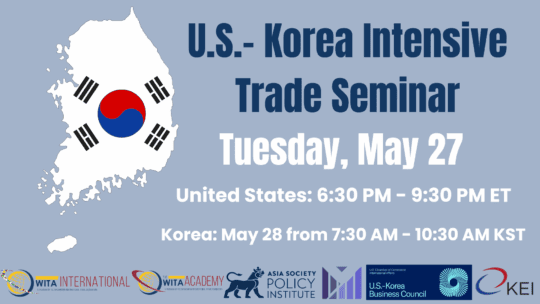This online event was hosted jointly by WITA International and the WITA Academy, in partnership with the Asia Society Policy Institute, the Korean Innovation Research Center, and the U.S. Chamber of Commerce U.S.-Korea Business Council and in collaboration with the Korea Economic Institute of America (KEI)
 |
 |
 |
 |
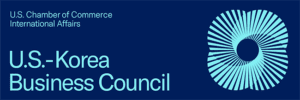 |
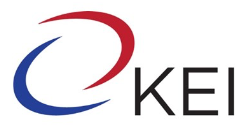 |
Please join WITA International and the WITA Academy, in partnership the Asia Society Policy Institute, the Korean Innovation Research Center, and the U.S. Chamber of Commerce U.S.-Korea Business Council, for a half-day Intensive Trade Seminar exploring key aspects of U.S. trade policy and U.S.-Korea economic relations.
This off-the-record program will offer Korean, U.S. and global stakeholders a deeper understanding of U.S. trade law, political dynamics, and current and emerging trade issues. The program will feature former trade officials, congressional experts, and private sector leaders with deep expertise in U.S.-Korea trade and regulatory policy.
Registration for the Mini Intensive Trade Seminar is open to the public and all sessions are off-the-record/Chatham House Rules.
If you cannot attend every session in real time, a link to the recording will be be sent to all registered attendees to watch on your time on a password protected site.
Program Agenda and Speakers
Tuesday, May 27, 6:30–7:15 PM ET / Wednesday, May 28, 7:30–8:15 AM KST
Session 1: Key U.S. Trade Dynamics – Understanding the Trump Trade Agenda
Everett Eissenstat, Partner, Public Policy Practice Group, Squire Patton Boggs; former Deputy Assistant to the President for International Economic Affairs and Deputy Director, National Economic Council; former Assistant U.S. Trade Representative for the Americas, Office of the U.S. Trade Representative; former Chief International Trade Counsel, United States Senate
Sally Laing, Partner, Akin; former Chief International Trade Counsel, Democratic Staff, U.S. Senate Committee on Finance; former Assistant General Counsel, Office of the U.S. Trade Representative
Moderator: J. David Park, Partner, Arnold & Porter
Tuesday, May 27, 7:15 – 8:00 PM ET / Wednesday, May 28, 8:15–9:00 AM KST
Session 2: U.S.-Korea Trade Issues & Negotiations
Wendy Cutler, Vice President, Asia Society Policy Institute; former Acting Deputy U.S. Trade Representative, Office U.S. Trade Representative
Yeo Han-koo, Senior Fellow, Peterson Institute for International Economics; former Trade Minister, Republic of Korea
Moderator: Tami Overby, Partner, DGA-Albright Stonebridge Group; former President of the U.S.-Korea Business Council, U.S. Chamber of Commerce
Tuesday, May 27, 8:00–8:45 PM ET / Wednesday, May 28, 9:00–9:45 AM KST
Session 3: Key U.S. Trade Agencies, Players, and Roles
Ryan Majerus, Partner, King & Spalding; former Acting Assistant Secretary for Enforcement and Compliance, U.S. Department of Commerce – International Trade Administration; former Senior Policy Advisor for Supply Chains, National Economic Council, The White House
Greta M. Peisch, Partner, Wiley Rein LLP; former General Counsel, Office of the U.S. Trade Representative; former Senior International Trade Counsel, U.S. Senate Committee on Finance
Moderator: Michael Smart, Managing Director, Rock Creek Global Advisors; former Director for International Trade and Investment, National Security Council, The White House; former Trade Counsel, Democratic Staff, U.S. Senate Committee on Finance
Tuesday, May 27, 8:45–9:30 PM ET / Wednesday, May 28, 9:45–10:30 AM KST
Session 4: Digital Trade & Digital Services Taxes (DSTs)
Jonathan McHale, Vice President, Digital Trade, Computer & Communications Industry Association; former Deputy Assistant USTR, ICT Services and Digital Trade, Office of the U.S. Trade Representative
Yongwook Paik, Professor, Kaist College of Business
Tiffany Smith, Vice President, Global Trade Policy, National Foreign Trade Council; former Director for Market Access, Office of the U.S. Trade Representative
Moderator: Haeyoon Kim, Founder and Publisher, Korea Tech & Trade Watch; former Nonresident Fellow, Korea Economic Institute of America; former Senior Researcher, Economic Section, Korean Embassy in Washington, D.C.
Speakers Biographies
Yeo Han-koo, Peterson Institute for International Economics (PIIE)
Yeo Han-koo is the former trade minister of the Republic of Korea. He has been senior fellow at the Peterson Institute for International Economics since June 2023. His research focuses on international trade policy, industrial policy, supply chain resilience, and economic security and international trade negotiations including the Indo-Pacific Economic Framework (IPEF) and the Comprehensive and Progressive Agreement for Trans-Pacific Partnership (CPTPP).
Yeo completed almost three decades of public service as trade minister of the Republic of Korea in 2022, in the final year of the Moon Jae-in presidency.
A veteran international trade negotiator, Yeo has been involved in a number of bilateral and multilateral trade negotiations, including as the chief negotiator for the Regional Comprehensive Economic Partnership (RCEP), Korea-UK Free Trade Agreement, Korea–Central America Free Trade Agreement, Korea-Indonesia Comprehensive Economic Partnership Agreement, and Korea-Philippines Free Trade Agreement. He was also an original participant in developing the Indo-Pacific Economic Framework for Prosperity.
While serving as commercial attaché at the Korean Embassy in Washington, he was involved in amendment negotiations of the Korea-US Free Trade Agreement and Section 232 steel negotiations. As Korean minister of trade, he oversaw conventional trade negotiations, export controls, and investment screening. Yeo also led negotiations for Korea’s export control measures against Russia in response to Russia’s invasion of Ukraine.
A graduate of Seoul National University, Yeo has served as visiting professor at the Seoul National University Business School, teaching international trade, negotiation, and economic security issues. Yeo holds an MBA from Harvard Business School and an MPA from Harvard Kennedy School.
Tami Overby, Senior Counselor, Albright Stonebridge Group; President, Asia Pathfinders
Tami Overby is a Senior Advisor in the East Asia & Pacific practice of Dentons Global Advisors-Albright Stonebridge Group (ASG). She is also a member of the Board of Advisors at the National Bureau of Asian Research.
Ms. Overby advises clients on Asian investment and trade matters, with a particular focus on Korea. Over the past three decades she has built a deep and wide understanding of the Asian trade and investment landscape and established a powerful network of government, corporate, and diplomatic relationships. This combination uniquely positions her to help clients solve problems.
Overby’s Asia expertise was first cultivated during her 20 plus years living and working in Seoul, Korea, and expanded when she returned to the United States to lead the US Chamber of Commerce’s Asia Practice. During her 8-year tenure, she grew revenue by over 300%, fought for fair trade and investment practices across the region, and helped numerous Fortune 500 companies navigate their strategic and operational challenges.
The scope of her experience includes policy work, high-profile trade disputes, stakeholder campaigns to support the passage of trade agreements between the U.S. and its Asian trade partners as well as market access advocacy and general investment counsel. Her bilateral and multilateral experiences include the TransPacific Partnership FTA, APEC, and the KORUS FTA.
Most recently, Overby spent four years with McLarty Associates where she quickly became one of the firm’s top revenue generators. In April 2022, she became President of Asia Pathfinders, a small boutique consulting firm specializing in U.S.-Asia economic affairs.
A graduate of the University of Arkansas with a BS in Business Administration and Management, Overby sits on the boards of The Korea Society, the Korean Economic Institute’s Advisory Council and as a Trustee of the US-Asia Institute. She is also the past President of the US Korea Business Council and the past President of AMCHAM Korea.
Throughout her career, Ms. Overby has had the privilege to host numerous heads of states and Dignitaries including China’s Xi Jinping, Japan’s Shinzo Abe, Indonesia’s Joko Widodo, along with Korea Presidents Kim Dae-jung, Roh Moo-hyun, Lee Myung-bak and Park Guen-hye to name a few. Ms. Overby is a frequent guest lecturer and regular contributor to national news media regarding US-South Korean economic relations, sharing her insights and expertise on Asian investment and championing fair trade and investment policies.
During her years in Korea, Overby received numerous Presidential awards and citations, including the Presidential Economic Advancement Citation from President Kim Dae-Jung, the Special Decoration Medal for Economic Service from Roh Moo-hyun, and the Industrial Service Merit-Silver Tower from Lee Myung-bak. Overby was particularly honored to have President Lee Myung-bak personally present the Industrial Service Award at a US-Korea Business Council meeting in Washington in 2009.
Dividing her time between Washington, DC, and the Maryland countryside, Overby can often be found walking her dogs and sipping a nice bourbon.
Everett Eissenstat, Partner, Public Policy Practice Group, Squire Patton Boggs; former Deputy Assistant to the President for International Economic Affairs and Deputy Director, National Economic Council
Everett Eissenstat is a Partner in the Public Policy Practice Group. Everett is one of the nation’s foremost global trade experts having served in senior positions in Congress, the Office of the US Trade Representative, the White House and a Fortune 50 company. He helps clients manage and mitigate geopolitical risk, influence international economic policy-making, and develop and execute successful international trade and investment strategies.
During a distinguished government career spanning over two decades, Everett served as deputy assistant to the president for international economic affairs and deputy director of the National Economic Council. Reporting to the president, the national security advisor and the director of the National Economic Council, he coordinated interagency policy development and implementation on international economic policy matters. He served as the president’s personal representative and principal negotiator to the G7, G20 and Asia Pacific Economic Cooperation (APEC) economic summits and led interagency preparations for all international summits.
Previously, Everett held key roles in the US House, Senate and the Office of the US Trade Representative. As the chief international trade counsel to the chairman of the US Senate Finance Committee (2011-2017 (under Sen. Orrin Hatch) and 2001-2006 (under Sen. Chuck Grassley)), Everett built and led professional international trade policy teams for two chairmen. He advised the chairmen on all international trade matters before the committee and coordinated the international trade work of the Finance Committee Republicans. His legislative responsibilities included Trade Promotion Authority, US Customs authorization, implementation of free trade agreements, preferential trade arrangements and sanctions policy. He was also responsible for the oversight of US government international trade agencies and international trade negotiations.
During his tenure as chief international trade counsel, Everett negotiated and helped gain congressional approval of the Trade Act of 2002 and the Bipartisan Congressional Trade Priorities and Accountability Act of 2015. He also gained approval of legislation implementing bilateral trade agreements with Australia, Chile, Colombia, Jordan, Morocco, Korea, Panama and Singapore, as well as the Dominican Republic-Central America-US-Free Trade Agreement (DR-CAFTA).
As assistant US trade representative for the Americas (2006-2011), Everett led negotiations of comprehensive bilateral free trade agreements with Colombia, Panama and Peru, as well as the entry into force of DR-CAFTA, a plurilateral trade agreement with Costa Rica, the Dominican Republic, El Salvador, Guatemala, Honduras and Nicaragua. In addition, he led negotiation of the US-Brazil Framework Agreement, the US-Canada Government Procurement Agreement and the US-Uruguay Trade and Investment Framework Agreement.
Everett also served as legislative director for Rep. Jim Kolbe, where he advised the congressman on international trade matters, appropriations and foreign affairs. He also served as special assistant in the Office of the Western Hemisphere at the Office of the USTR. Everett also served as a member of the 2000 Presidential Transition Team for the Office of the US Trade Representative, the US Department of Commerce Office of Import Administration and the International Trade Commission.
Everett most recently served as chair of North America and global trade lead at a boutique global public relations consultancy firm. He was senior vice president at a multinational automotive manufacturer (2018-2021) reporting to the CEO and managing over 100 public policy professionals worldwide. He helped navigate a range of challenges, including labor relations, supply chain disruptions and the regulatory and compliance implications of transitioning from internal combustible engines to electric vehicles.
J. David Park, Partner, Arnold & Porter
J. David Park is head of the firm’s International Trade group and advises U.S. and international clients on a variety of international trade issues. He has extensive experience litigating trade remedies, including antidumping, countervailing duty and safeguard actions, before U.S. agencies, courts and the WTO, as well as counseling clients on U.S. customs, export controls and economic sanctions laws. He also counsels clients on trade policy matters, market access and WTO disputes. He represents clients before the U.S. Department of Commerce, the U.S. International Trade Commission, U.S. Customs and Border Protection, the Court of International Trade and the U.S. Court of Appeals for the Federal Circuit. He has achieved a number of significant victories on behalf of his clients in major trade remedies litigation cases.
Wendy Cutler, Vice President, Asia Society Policy Institute; former Acting Deputy U.S. Trade Representative, Office U.S. Trade Representative
Wendy Cutler is Vice President at the Asia Society Policy Institute (ASPI) and the managing director of the Washington, D.C. office. In these roles, she focuses on leading initiatives that address challenges related to trade, investment, and innovation, as well as women’s empowerment in Asia. She joined ASPI following an illustrious career of nearly three decades as a diplomat and negotiator in the Office of the U.S. Trade Representative (USTR), where she also served as Acting Deputy U.S. Trade Representative. During her USTR career, she worked on a range of bilateral, regional, and multilateral trade negotiations and initiatives, including the U.S.-Korea Free Trade Agreement, the Trans-Pacific Partnership, U.S.-China negotiations, and the WTO Financial Services negotiations. She has published a series of ASPI papers on the Asian trade landscape and serves as a regular media commentator on trade and investment developments in Asia and the world.
Michael Smart, Managing Director, Rock Creek Global Advisors; former Director for International Trade and Investment, National Security Council, The White House; former Trade Counsel, Democratic Staff, U.S. Senate Committee on Finance
Michael J. Smart is a Managing Director at Rock Creek Global Advisors, where he focuses on international trade and investment policy, including market access and regulatory matters. He also advises multinational companies on sanctions, supply chain policy, and trade-related climate measures.
Mr. Smart previously served as Trade Counsel on the Democratic staff of the US Senate Committee on Finance. In that role, he advised Chairman Max Baucus (D-MT) and members of the committee on various trade matters, including World Trade Organization negotiations and dispute settlement, free trade agreements, agricultural trade, and the trade aspects of legislation to address climate change.
Before joining the Finance Committee, Mr. Smart was Director for International Trade and Investment on the staff of the National Security Council at the White House. Mr. Smart focused on the Doha Development Agenda, trade in financial services, free trade agreements, and bilateral investment treaties. He also served as the lead White House staff for cabinet-level dialogues with Brazil and India.
Mr. Smart was previously an associate at the law firm of Sidley Austin LLP, where his practice focused on international trade and investment policy and dispute resolution. He represented companies and governments in WTO, investment treaty, and NAFTA disputes. Earlier in his career, Mr. Smart was Legislative Director for former Congressman Earl Pomeroy (D-ND).
Mr. Smart has appeared on CNN International, BBC News, Bloomberg News, and Channel News Asia and has been quoted in publications such as the New York Times, Washington Post, Wall Street Journal, Politico, and Financial Times.
Mr. Smart is a member of the Executive Circle of the Institute of International Economic Affairs at The George Washington University and a member of the Board of Directors of the Washington International Trade Association. Mr. Smart received his BA in International Affairs from The George Washington University (Phi Beta Kappa and magna cum laude) and his JD from Georgetown University Law Center (cum laude).
Greta M. Peisch, Partner, Wiley Rein LLP; former General Counsel, Office of the U.S. Trade Representative; former Senior International Trade Counsel, U.S. Senate Committee on Finance
Greta M. Peisch is a Partner at Wiley Rein. She brings nearly 15 years of experience in international trade matters. Most recently, she served as General Counsel for the Office of the United States Trade Representative (USTR) where she was a primary legal advisor to the agency, including with respect to trade enforcement and trade agreement implementation and negotiations.
While at USTR, Greta led the USTR’s enforcement agenda, including World Trade Organization (WTO) and trade agreement dispute settlement and implementation of Sections 201 and 301 of the Trade Act of 1974.
Greta negotiated the settlement of significant trade disputes, including a years-long dispute with the European Union regarding large civil aircraft; disputes related to the U.S. imposition of tariffs on steel and aluminum and the EU’s retaliatory tariffs; and a dispute with Canada related to a U.S. solar safeguard measure. In addition, she led the implementation of the first-ever reviews and panel request under the novel Rapid Response Labor Mechanism of the U.S.-Mexico-Canada Agreement. She also oversaw negotiations related to Critical Minerals Agreements with Japan, the EU, and the United Kingdom and advised on legal issues in trade agreement negotiations and implementation, including with respect to the Indo-Pacific Economic Framework (IPEF) and the U.S.-Taiwan Initiative on 21st Century Trade.
Prior to her time at USTR, Greta was Senior International Trade Counsel for the U.S. Senate Committee on Finance. In this role, she developed policy positions and legislation concerning trade policy, including the renegotiation of the North American Free Trade Agreement (NAFTA) and the drafting, passage, and implementation of the Trade Facilitation and Trade Enforcement Act of 2015, the United States-Mexico-Canada Agreement Implementation Act, and the Miscellaneous Tariff Bill Act of 2018.
With additional experience involving digital trade, labor, and the environment, Greta is poised to help clients navigate all aspects of trade’s legal landscape.
Ryan Majerus, Partner, King & Spalding; former Acting Assistant Secretary for Enforcement and Compliance, U.S. Department of Commerce – International Trade Administration; former Senior Policy Advisor for Supply Chains, National Economic Council, The White House
Ryan Majerus is a Partner in the International Trade Team of King & Spalding. His practice covers trade remedies, trade policy and negotiations, trade agreement enforcement, import compliance, supply chains, and government procurement. He has particular experience in the steel, aluminum, automotive, agricultural, and energy industries. He recently performed the functions of the Assistant Secretary for Enforcement and Compliance at the U.S. Department of Commerce, International Trade Administration for over a year, serving as the decisionmaker for every AD/CVD duty imposed by the U.S. He also was the Senior Policy Advisor for Supply Chains at the White House National Economic Council under President Joe Biden, where he played a central role in U.S. industrial strategy.
Prior to his 4 years in political roles at Commerce and the White House, Ryan had a decade-long legal career in the federal government, serving as the Senior Counsel for Appellate And Supreme Court Litigation at the U.S. Department of Agriculture (“USDA”); as Assistant General Counsel at the Office of the USTR under the first Trump Administration, where he litigated several disputes before the WTO involving U.S. trade remedies and government subsidies and was a lead on agriculture trade policy. He also was a trial attorney in the Civil Division of the DOJ, where he represented Commerce as lead counsel in dozens of trade remedies cases before the U.S. Court of International Trade and the U.S. Court of Appeals for the Federal Circuit, and defended numerous agencies in government contracts and bid protest litigation before the U.S. Court of Federal Claims and Federal Circuit.
Yongwook Paik, Professor, Kaist College of Business
Yongwook Paik is a tenured professor at the KAIST College of Business, located in Seoul, Korea. His research focuses on entrepreneurship, innovation, and strategy and how they are interrelated with institutions and public policies. He serves as a member of the editorial review board or as a referee for numerous top-tier academic journals in strategy, entrepreneurship, and economics. His research has been published in premier academic journals such as the Strategic Management Journal, Organization Science, Strategic Entrepreneurship Journal, and the Journal of Economics & Management Strategy, among others. Professor Paik joined KAIST in 2018. Prior to joining KAIST, he was an assistant professor at the Marshall School of Business, University of Southern California (USC) and the Olin Business School at Washington University in St. Louis (WashU). He earned his Ph.D. in Economics from the University of California at Berkeley. Prior to earning his Ph.D., he worked as a patent attorney in one of the largest law firms in South Korea, Kim & Chang, serving multinational corporations as well as small and medium-sized entrepreneurial companies.
Jonathan McHale, Vice President, Digital Trade, Computer & Communications Industry Association; former Deputy Assistant USTR, ICT Services and Digital Trade, Office of the U.S. Trade Representative
Jonathan McHale is the Vice President, Digital Trade at CCIA, where he leads the Association’s digital trade advocacy in the United States and international fora.
Until 2022, he was the Deputy Assistant U.S. Trade Representative for ICT Services and Digital Trade. He has two decades of experience working to open foreign markets in the telecommunications and digital trade sectors at both the Department of State and USTR, through policy development, negotiation, enforcement, and dispute settlement. He was the lead negotiator for the USMCA Digital Trade chapter, the Telecommunications and Electronic Commerce issues in the Trans-Pacific Partnership FTA, as well as KORUS, AUSFTA, and the Singapore-U.S. FTA. He was responsible for digital issues in the U.S.-China Bilateral Investment Treaty negotiations, and led the formulation of policy on trade-related aspects of electronic commerce in WTO and regional organizations, and the enforcement ICT and digital trade commitments in the WTO.
Prior to joining USTR, he served as an economic officer at the Department of State in Tokyo, Washington D.C. and Paris. He holds a B.A. from Brown University and an M.A. in international relations from Columbia University.
Tiffany Smith, Vice President, Global Trade Policy, National Foreign Trade Council; former Director for Market Access, Office of the U.S. Trade Representative
Tiffany Smith is Vice President for Global Trade Policy at the National Foreign Trade Council, the leading business association dedicated solely to advancing the interests of U.S. companies in international commerce.
As Vice President, she leads efforts to advance global commerce and strengthen U.S. companies’ competitiveness abroad. She oversees the development and execution of NFTC’s trade policy strategy and leads work on key bilateral and regional trade relationships, the World Trade Organization and tariff reform issues.
Tiffany previously served as senior policy advisor in Mayer Brown’s international trade and government relations practices where she advised companies, trade associations, and nonprofits on international trade policy and regulations.
Prior to joining Mayer Brown, she worked for 16 years in the Federal Government, serving in positions in the Office of the U.S. Trade Representative, the United States Senate, and the Department of Commerce.
During her time in the Senate, Ms. Smith was one of the lead staff involved in drafting and securing passage of the Trade Act of 2002.
While at USTR, Tiffany led industrial goods market access negotiations for nine Free Trade Agreements and for negotiations allowing several countries to join the WTO. Tiffany worked with key industry sectors, including autos, chemicals, consumer electronics, and information technologies to achieve results in trade agreements that facilitated U.S. exports.
She is a graduate of The George Washington University (M.A., International Affairs) and the Stephen F. Austin State University (B.A., Political Science).
Haeyoon Kim, Founder and Publisher, Korea Tech & Trade Watch; former Nonresident Fellow, Korea Economic Institute of America; former Senior Researcher, Economic Section, Korean Embassy in Washington, D.C.
Haeyoon Kim is a former Nonresident Fellow at the Korea Economic Institute of America. Her work focuses on US-East Asia relations, particularly with South Korea and Japan, in the areas of technology and trade. She has previously worked at the Asia Society Policy Institute in Washington, DC, and held roles at the South Korean Foreign Ministry. Her research interest is in East Asia’s tech regulations within the broader geopolitical landscape, particularly their intersection with the EU’s regulatory ambitions and the new US administration’s approach to antitrust and digital trade policies. Haeyoon holds an MPA from Columbia University and a BA in Political Science from the University of Nebraska–Lincoln.
Sally Laing, Partner, Akin; former Chief International Trade Counsel, Democratic Staff, U.S. Senate Committee on Finance; former Assistant General Counsel, Office of the U.S. Trade Representative
Sally Laing is a Partner at Akin. She draws on 15 years of executive branch, congressional and private practice experience. Sally advises clients on the intersection of international trade law and U.S. public policy. In this capacity, she guides clients through complex strategic decisions regarding regulatory compliance, supply chain resiliency and overcoming trade barriers. Leveraging experience as a senior government official, Sally is able to counsel clients on cutting-edge trade issues, industrial policy and other emerging challenges.
Sally most recently served as Chief International Trade Counsel to Chair Ron Wyden (D-OR) and Senate Finance Democrats. In this capacity, Sally drafted, negotiated and shepherded the passage of significant trade legislation, including the U.S.-Mexico-Canada Agreement (USMCA) and Taiwan Agreement implementation bills. She also led Senate oversight of implementation of new customs requirements, including the Uyghur Forced Labor Prevention Act (UFLPA), and U.S. trade negotiations through high-level engagement with U.S. officials, foreign governments and stakeholders from Japan, South Korea, Malaysia, Indonesia, Australia, Kenya, Taiwan and elsewhere. Sally also worked extensively with the Senate Finance Committee tax team and Senate leadership on the drafting, defending and passing of the Inflation Reduction Act (IRA).
Prior to joining the staff of the Senate Finance Committee, Sally was Assistant General Counsel at USTR under both Democratic and Republican Administrations. In this role, Sally researched, developed and litigated several critical WTO disputes, including helping to develop the factual and legal basis for the last two significant U.S. WTO cases against China. She was also charged with drafting and negotiating portions of the USMCA agriculture and sanitary and phytosanitary (SPS) chapters, as well as product-specific annexes and side letters. During her time at USTR, Sally worked extensively with U.S. government agencies such as Customs and Border Protection (CBP), the Department of Commerce (DOC), the U.S. Department of Agriculture (USDA) and the Department of State.
Prior to serving in government, Sally was an associate at Akin, where she worked on trade policy, trade remedies and customs matters.
Who Should Attend?
Korean government officials, business leaders, and trade professionals, along with all WITA members or non-members.
Thank you to our WITA Academy Sponsors

Thank you to our WITA International Sponsors
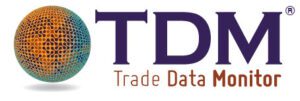 |
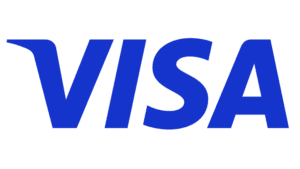 |
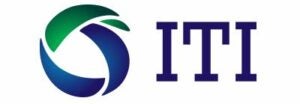 |

